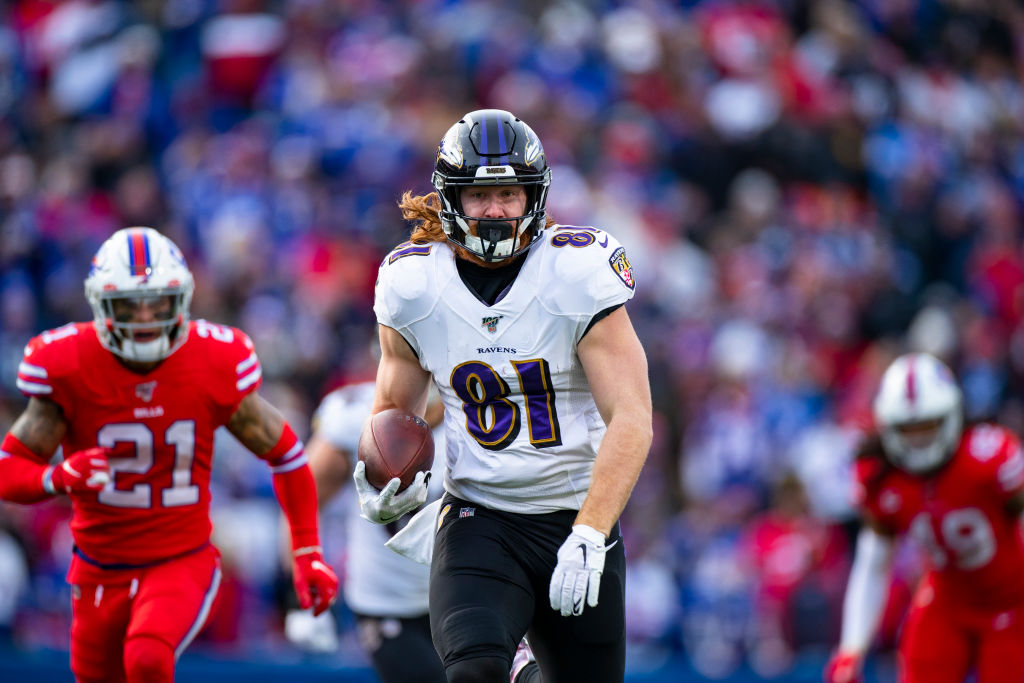NFL
How New Atlanta Tight End Hayden Hurst Found New Life After Facing Death

When Baltimore traded tight end, Hayden Hurst, to the Atlanta Falcons this week, the Ravens 2018 first-round draft pick knew it would offer him a chance at a fresh start. And if there’s anyone who knows about fresh starts, it’s Hurst. Four years ago, Hurst had an epiphany handcuffed to a hospital bed and that’s when he decided to start a completely new life just hours after nearly ending it.
Life as a Raven
Back in 2018, the Baltimore organization thought very highly of Hayden Hurst. So much, in fact, they took him as the first tight end of the draft, the 25th overall pick, and seven slots ahead of quarterback Lamar Jackson.
In Hurst, the Ravens saw a tight end that in his last two seasons at South Carolina had caught 92 passes for 1,175 yards and four touchdowns. He elevated his stock at the NFL combine running a 4.62.
His start in Baltimore was less than ideal when Hurst broke his foot in the last preseason game, forcing him to miss the first month of the season. Tight end Mark Andrews, a third-round pick in the same draft, took advantage of the opportunity and became the Ravens’ primary tight end target last season.
Hurst played all 16 games in 2019, started two, and finished the season with 30 receptions, 349 yards, and pair of touchdowns. Based on the trade, the Ravens believed Hurst was dispensable and opted to send him to Atlanta.
A different future and a troubled past
Hayden Hurst never envisioned a career playing in the NFL. The 6-foot-4-inch 245-pounder was a highly touted baseball pitcher coming out of high school.
In 2013, the Pittsburgh Pirates drafted the hard-throwing right-handed pitcher and sent him to Bradenton, Fla. and the Gulf Coast League. And that’s when the trouble started.
Soon after arriving in Florida, Hurst developed the yips, a type of performance anxiety disorder that affects baseball players so badly they have no idea where the ball is going once it leaves their hands. In Hurst’s case, each pitch sailed over the batters’ heads.
Hurst made a single appearance in professional baseball and pitched one-third of an inning. He walked five batters. And that’s when he plunged into darkness. Sweaty palms. Nauseous. Panic attacks. And drugs. Lots of drugs.
It started with straight whiskey, then mixed in some xanax, and topped it off with cocaine or any drug he could find. A cocktail concoction that sent Hurst into a tailspin faster than his 97 mph fastball. In 2016, he quit baseball.
Hitting rock bottom
Out of baseball, Hurst wanted to play college football. He initially got denied by Will Muschamp trying to walk-on at Florida but was accepted at South Carolina by Steve Spurrier.
In football, he found a new direction and some hope but still had some dark demons lingering inside. Besides the drugs and alcohol, Hurst had a family history of anxiety, depression, and suicide. Both his uncle and cousin shot themselves.
Hurst finally had to confront those demons one night a couple of months following his freshman year when he drank so much he blacked out. All he could recall was cutting his wrist in a parking lot with a knife from his vehicle. He didn’t know how he made it to the apartment steps. He called his girlfriend. She rushed over and found him unconscious.
The next day he awoke alone in the hospital handcuffed to a bed with blood-soaked clothes. At that moment, Hurst had an epiphany. He was going to die, or he was going to change.
Paying it forward
In February 2020, Hurst celebrated four years of sobriety. Now he is trying to help others facing similar challenges with anxiety and depression. He has spoken at high schools and colleges in Maryland and Florida, talking about the need for the younger generation to address mental health and remove the stigma often associated with it.
In 2018, Hurst convinced his mother to retire from her job to help operate his foundation, which raises money to help teenagers in Baltimore and Jacksonville cope with mental health issues, especially suicide prevention.
From the darkness of that fateful night years ago, Hurst is working to make a difference in the lives of others. Even with his address shifting south to Georgia, you can be sure he will continue his invaluable work in those same communities while creating something similar in Atlanta.
When Hurst starts his first Falcons training camp this summer, he will absorb everything about the new experience enjoying the new fans, new stadium, and new teammates. He won’t be worried about statistics. The numbers will be there when Hurst puts in the hard work. He knows there are more important things in life, like life itself.











